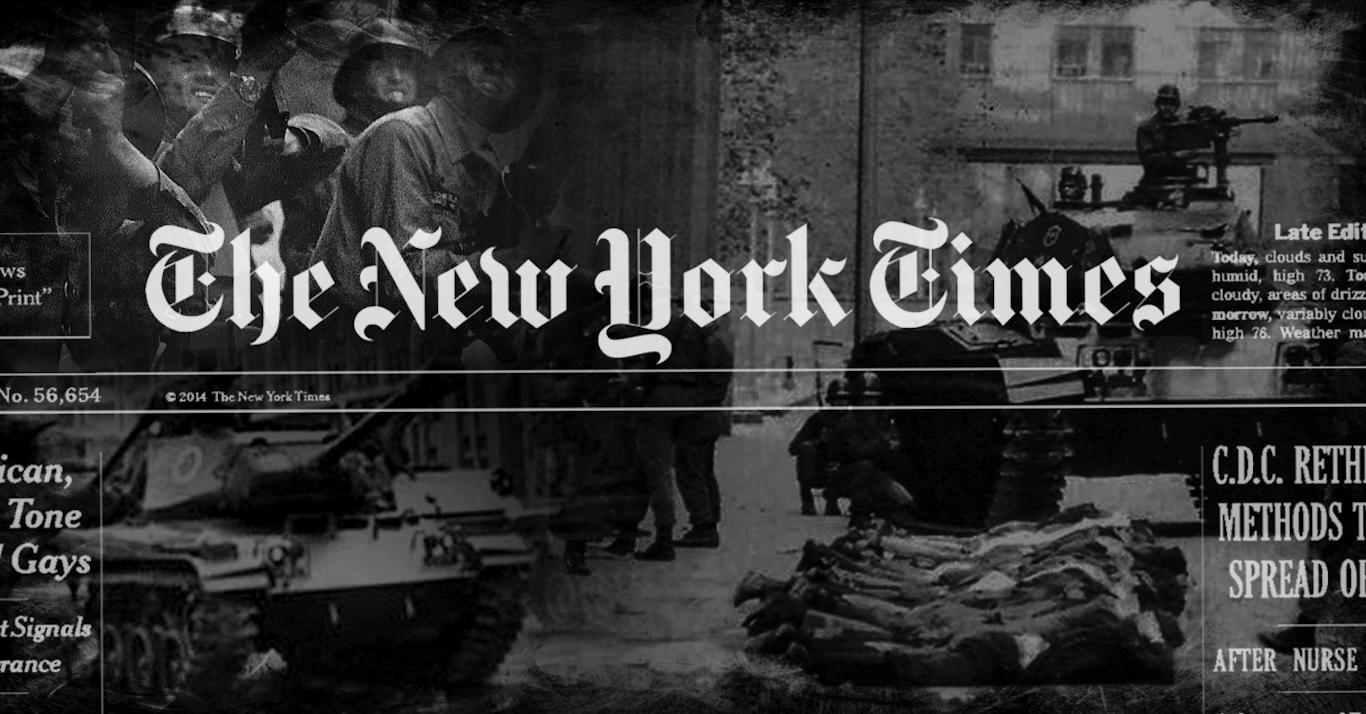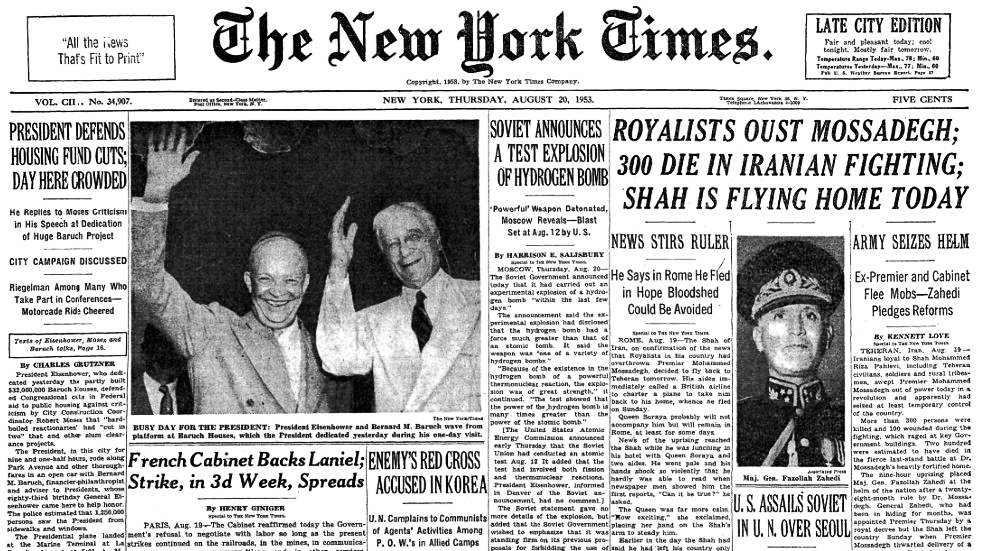________
Source: MPN
The New York Times Editorial Board, it seems, rarely meets a coup backed by the US government that it doesn't approve of.
by Alan Macleod | November 27, 2019
Bolivian President Evo Morales was overthrown in a U.S.-backed military coup d'état earlier this month after Bolivian army generals appeared on television demanding his resignation. As Morales fled to Mexico, the army appointed right-wing Senator Jeanine Añez as his successor. Añez, a Christian conservative who has described Bolivia's indigenous majority as "satanic", arrived at the presidential palace holding an oversized Bible, declaring that Christianity was re-entering the government. She immediately announced she would "take all measures necessary" to "pacify" the indigenous resistance to her takeover.
This included pre-exonerating the country's notorious security services of all future crimes in their "re-establishment of order," leading to massacres of dozens of mostly indigenous people.
The New York Times, the United States' most influential newspaper, immediately applauded the events, its editorial board refusing to use the word "coup" to describe the overthrow, claiming instead that Morales had "resigned," leaving a "vacuum of power" into which Añez was forced to move. The Times presented the deposed president as an "arrogant" and "increasingly autocratic" populist tyrant "brazenly abusing" power, "stuffing" the Supreme Court with his loyalists, "crushing any institution" standing in his way, and presiding over a "highly fishy" vote.
This, for democratic-minded Bolivians, was "the last straw" and forcing him out "became the only remaining option,” the Times extolled. It expressed relief that the country was now in the hands of “more responsible leaders" and stated emphatically that the whole situation was his fault; "There can be little doubt who was responsible for the chaos: newly resigned president Evo Morales," the editorial board stated in the first paragraph of one article.
The Times, according to Professor Ian Hudson of the University of Manitoba, co-author of "Gatekeeper: 60 Years of Economics According to the New York Times," remains America's most influential news outlet in shaping public opinion.
"Despite the changing media landscape and the financial troubles of old school journalism models – including the New York Times – it remains the agenda setter. Social media often use or respond to Times stories. It is still probably the single most referenced news outlet in the U.S. Other websites, like Yahoo get more hits, but they do not report or create their own stories. The New York Times still ranks as the top investigative and opinion setting news organization” he told MintPress News.
The first draft of history
Newsrooms across America are sent advanced copies of the Times' front page so they will know what is "important news" and adjust their own coverage accordingly. In this way its influence extends well beyond its nearly 5 million subscribers, its output becoming the first draft of history. Yet, when it comes to U.S. intervention, the Times offers its "consistent support" for American actions around the world, Hudson says, claiming that the latest Bolivia example "very much followed this trend." Indeed, there has rarely been an effort at regime change that the paper did not fully endorse, including the following six examples.
Iran 1953
In 1953, the CIA engineered a coup against the administration of Mohammad Mossadegh, installing the Shah as an autocrat in his place. Mossadegh, a secular liberal reformer, had angered Western governments by nationalizing Iran's oil industry, arguing that the country's resources should be owned by and used to benefit the people of Iran. The Shah presided over decades of terror and human rights abuses, finally being overthrown in the revolution of 1979.
The front page of the New York Times on August 20, 1953. Photo | @OnThisDayNYT
The Times expressed a "deep sense of relief," many felt that Mossadegh, a "fanatical power-hungry man" and a Kremlin stooge who had "wrecked the economy" in his "bid for dictatorship” had been deposed. The editorial board gave a warning to others who might try to nationalize industries owned by American corporations: "Underdeveloped countries with rich resources now have an object lesson in the cost that must be paid by one of their number which goes berserk with fanatical nationalism," it wrote, two days after Mossadegh's ouster.
Brazil 1964
Like Mossadegh, Brazilian President Joao Goulart was far from a communist; the center-left reformer who had been in power since 1961 modeled himself after John F. Kennedy. He was overthrown in a U.S.-supported military coup d'état that brought about over twenty years of fascist dictatorship that saw tens of thousands of people arrested and tortured.
Two days after the event, the Times' editorial board announced, "We do not lament the passing of a leader who had proved so incompetent and so irresponsible." As with Bolivia, it refused to use the word "coup," instead claiming that Goulart, who "had almost no supporters," was deposed in "another peaceful revolution."
One month later, a report entitled "Brazil relieved by Goulart's Fall" claimed there was "no outcry or even concern" over the events, but instead a "widespread feeling of deep relief and optimism" in the country. It stated that all of Brazil had "written off" the "extremist" and "far leftist" "regime" and supported the "revolt" against him. In particularly Orwellian fashion, it claimed that the "nation appears to have been yearning" for a "political clean up" of "extremists," applauding the widespread imprisonment of officials in the Goulart administration on the grounds that they were "communists."
Please go to MPN to read the entire article.
________
NYT Russia Bashing Never Quits
by Stephen Lendman (stephenlendman.org – Home – Stephen Lendman)
November 29, 2019
The self-styled newspaper of record is a virtual deep state propaganda bullhorn, masquerading as legitimate journalism — what it long ago abandoned in service to US imperial and monied interests.
Time and again, irresponsible disinformation Russia bashing is featured in its daily editions.
On Thanksgiving Day, it slammed the notion of anyone recognizing the Republic of Crimea as part of the Russian Federation.
It turned truth on its head, saying Russia "grabbed Crimea," ignoring history by reinventing it.
On March 16, 2014, Crimeans voted overwhelmingly by referendum to rejoin Russia, wanting a historic mistake corrected — the process judged open, free and fair by international observers.
Turnout exceeded 83%. Nearly 97% of Crimeans chose Russia, rejecting illegitimate Kiev putschist rule.
No Kremlin pressure or intimidation influenced voters. No Russian soldiers were in sight. None invaded.
US-led Western propaganda turned truth on its head, ignoring international law.
Self-determination is a universal right. People everywhere have the right to choose their sovereignty and political status with no outside interference.
The UN Charter affirms "the principle of equal rights and self-determination of people…"
Article 1 of the International Covenant on Civil and Political Rights (ICCPR) states:
"All peoples have the right of self-determination. By virtue of that right, they freely determine their political status and freely pursue their economic, social and cultural development."
A Kremlin document said reunification was “based on the free and voluntary expression of will by the peoples of Crimea at a nationwide referendum, held in the Autonomous Republic of Crimea and the city of Sevastopol on March 16, 2014, during which the people of Crimea made the decision to reunite with Russia."
Two new Russian constituent territories were formed – the Republic of Crimea and Federal City of Sevastopol, given "special autonomous status."
Crimea is Russian territory, a permanent legal status not about to change.
The Times: “Apple…joined Google, Yandex and some other technology companies in redrawing Ukraine’s borders to satisfy Moscow's territorial claims…(O)utside Russia, Crimea remains part of Ukraine."
Fact: No borders were "redraw(n)." The above companies, others and various nations recognize Crimea as part of Russia.
They include China, Cuba, Nicaragua, Syria, Venezuela, Armenia, Bolivia (at least until the CIA coup toppled its democratic government), North Korea, Cambodia, and South Sudan, among others.
Colonized Europe, other US vassal states, the Times and other establishment media refuse to recognize reality.
The US and EU imposed illegal sanctions on Russia over Crimea.
The Times: "Crimea…was recognized by Moscow…as belonging to Ukraine until Russia changed its mind in 2014," adding:
"After sending (nonexistent) 'little green men' (sic) — Russian special forces in uniforms stripped of identifying insignia (sic) — to seize Crimean government buildings (sic), it held a referendum that endorsed the change (sic)."
"Russia hailed the vote as an act of democracy, but the West viewed it as window-dressing for an unacceptable military aggression.”
The shameful Times reinvented history, debunked above, needs no further elaboration.
Separately, the Times is unrelenting in beating the dead horse Big Lie that won’t die about Russian US election meddling — not a shred of evidence suggests or was ever presented because none exists.
The Times: "Trump is president only because a constitutional provision invalidated the choice of the American people (sic)."
Please go to stephenlendman.org to read the entire article.
________
We have no other choice than to bring down the mainstream media. Here is the strategy to do it:
American Pravda: Breaching the Media Barrier
More on the NYT:
Welcome to the Tomato Bubble: The Anti-New York Times
NYT's "Leaked" Chinese Files Story Covers For Terrorism
'Sorry, but it's fake…again': Russian military debunk NYT report on bombing of civilians in Syria


No comments:
Post a Comment
Note: Only a member of this blog may post a comment.